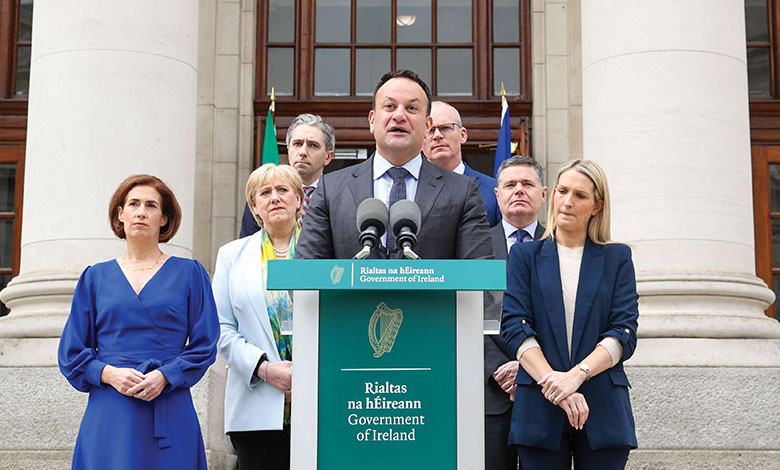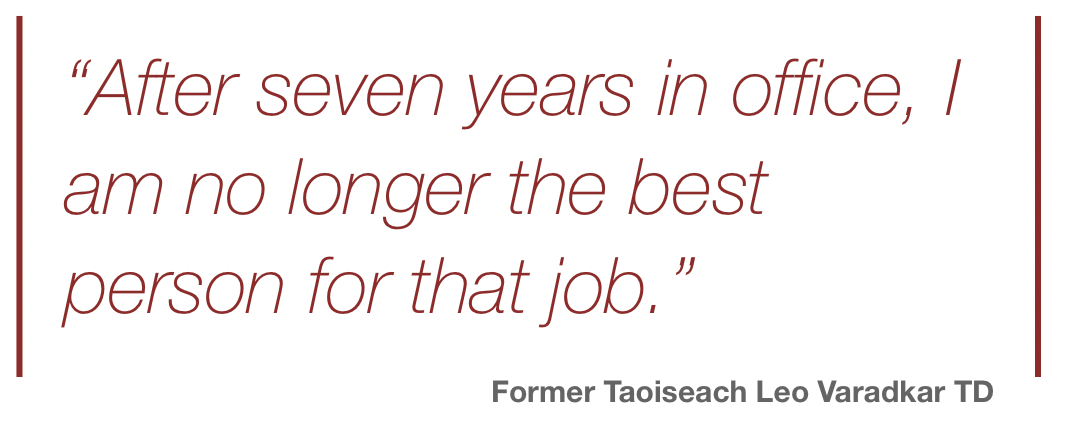Varadkar steps down as Taoiseach

In March 2024, Leo Varadkar TD shocked his coalition colleagues when he announced his resignation as Taoiseach, insisting he is “no longer the best person for the job”.
Flanked by party colleagues on the steps of Government Buildings in Dublin, Varadkar briefed the assembled media and the public on why he would be stepping down.
The “unexpected shock” of his departure from politics was attributed to “both personal and political” reasons.
Furthermore, while the timing of his decision was ambiguous, he stated in his speech there was no “right time” to leave, it was “as good a time as any”.
“After careful consideration and some soul-searching, I believe a new Taoiseach will be better placed than me…to renew and strengthen the top team, to refocus our message and policies, and to drive implementation. After seven years in office, I am no longer the best person for that job,” he stated.
Varadkar was first elected to the Dáil in 2007 and then appointed by former Taoiseach Enda Kenny as Minister for Transport in 2011.
The TD for Dublin West started his speech reminiscing on his political journey. “I have had the privilege to serve for the past 20 years as a public representative, 13 as a member of cabinet, seven as leader of my party, and most of those as Taoiseach of this great country. It’s been the most fulfilling time of my life,” he said.
Ostensibly, Varadkar had been deliberating this decision since Christmas 2023. One element of rationale for his resignation in March is to ensure sufficient time for his successor a good chance of establishing a profile to triumph in the coming elections.

Taoiseach Simon Harris TD will have a full two months to prepare for the local and European elections, and up to a year before the next general election.
Varadkar at times got emotional when he spoke on his main achievements during his time in office. “Working with colleagues, I have had the honour of helping to lead Ireland from unemployment to full employment, from budget deficit to budget surplus, from austerity to prosperity, through a pandemic in which we saved lives and livelihoods, and through Brexit when we prevented a hard border between north and south and protected our place in Europe,” he insisted.
Until now, he had been the youngest person to take up the role of Taoiseach and was regarded by allies as being a progressive leader. During his speech, he also referenced what he regards to be his governments’ achievements in this sphere.
“I am proud that we have made the country a more equal and more modern place when it comes to the rights of children, the LGBT community, equality for women and their bodily autonomy. More recently, we have led the country through an inflation and cost of living crisis, the worst of which is now thankfully behind us.”
He also mentioned the progress made in regard to Ukrainian refugees, poverty and housing. “I am proud that we, the Irish people, welcomed over 100,000 Ukrainian refugees to our shores when they needed our protection, notwithstanding the challenges this brings.
“In my time as Taoiseach, we reduced consistent poverty and income inequality. Housing construction has more than doubled, with 500 people becoming homeowners every week for the first time – the highest number in almost two decades.”
There was also mention of the political context in the North: “The institutions of the Good Friday Agreement are working again, and our trading relationship with the United Kingdom, in the post-Brexit era, is settled and stable.”
Varadkar gave a public analysis of his party’s future. “I believe this government can be re-elected. I believe my party, Fine Gael, can gain seats in the next Dáil. Most of all, I believe that would be the right thing for the future of our country, continuing to take us forward. Protecting what we achieved and building on it,” he stated.
He also reflected that on a personal level, “politicians are human beings” with limitations. “We give it everything until we cannot anymore and then we have to move on,” he said.
Varadkar did not hint of his future ambitions, and insisted that he had “nothing else lined up or in mind,” but is instead “looking forward to having the time to think about them.”





